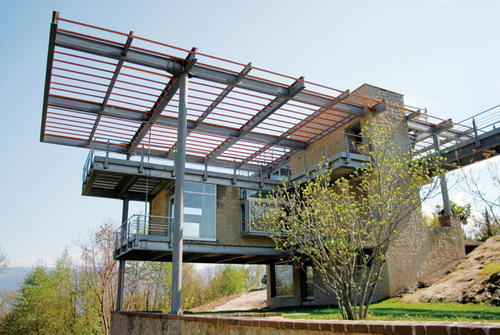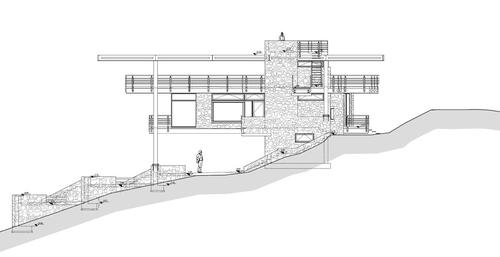The Deck
 [Image: Sergio Bianchi's Bellegra retreat, via Metropolis].
[Image: Sergio Bianchi's Bellegra retreat, via Metropolis].In an unfortunately subscriber-only article, Metropolis calls our attention to "an artists’ retreat in Bellegra, a small town 40 miles southeast of Rome."
The building, we read, was designed by Sergio Bianchi, whose "idea for a Modernist villa designed according to the principles of organic architecture," proved to be so controversial in the context of Italy's "archaic building laws" that it took more than six years to construct.
The design itself was "inspired" by Frank Lloyd Wright’s Fallingwater. Metropolis writes that, "although the villa – which has a biological sewage system and a roof fitted for solar panels – is more visually and environmentally harmonious with the landscape than its neighbors, a group of squat clay-tile-roof stucco homes, it provoked strong resistance from local authorities."
Those authorities said, somewhat unbelievably, that the building "was too much like science fiction.”
 [Image: Sergio Bianchi's Bellegra retreat, via Metropolis].
[Image: Sergio Bianchi's Bellegra retreat, via Metropolis].In any case, I'm posting this really just because I love the deck – in fact, I love the whole structure of this building.
I love how, as you can see in that first picture, above, there's a small room, not quite cantilevered, elevated over an outdoor patio – and that, above that room, there's a deck, poised under a slatted horizontal screen that allows you to watch the sky.
I also love the little walkway that extends beyond the right-hand side of the picture. The whole thing is like this maze of platforms, decks, patios, and cantilevered rooms, connected by terraces, hanging off a limestone core in the middle of the Italian countryside.
I'd like two, please.





Comments are moderated.
If it's not spam, it will appear here shortly!
Yeay - that is indeed a very lovable building.
One can really wonder why local authorities initally say no to a building like this... I believe reactionary conservatism is a basic human trait so to say.
Very impressive, any more detailed shots would be great. Looks like it could easily fit within a variety of terrains
Misguided development is also a basic human trait apparently too.
Don't get me wrong, I love the design (not sure it's really a liveable house, but it does have its charms), not to mention the eco-features.
But it also looks like it could clash horribly with a variety of other terrains and pre-existing settlements. In Europe, there's a greater feeling of harmony in communities, as well as a built-up culture worth preserving. Not seeing the surroundings of the structure (is it conspicuous in some traditional landscape? are there other contemporary or modern structures around?) makes it hard to tell if the local authorities are grand-standing or the owner/developer is being pompous.
Wouldn't be very practical in areas with cold winters, high winds or seismic activity
It is very nice. Bianchi did a great job.
I think it may have been misconstrued in the version we see in the US. Here is another perspective:
http://www.progettinetwork.it/viewdoc.asp?co_id=3841
Post a Comment